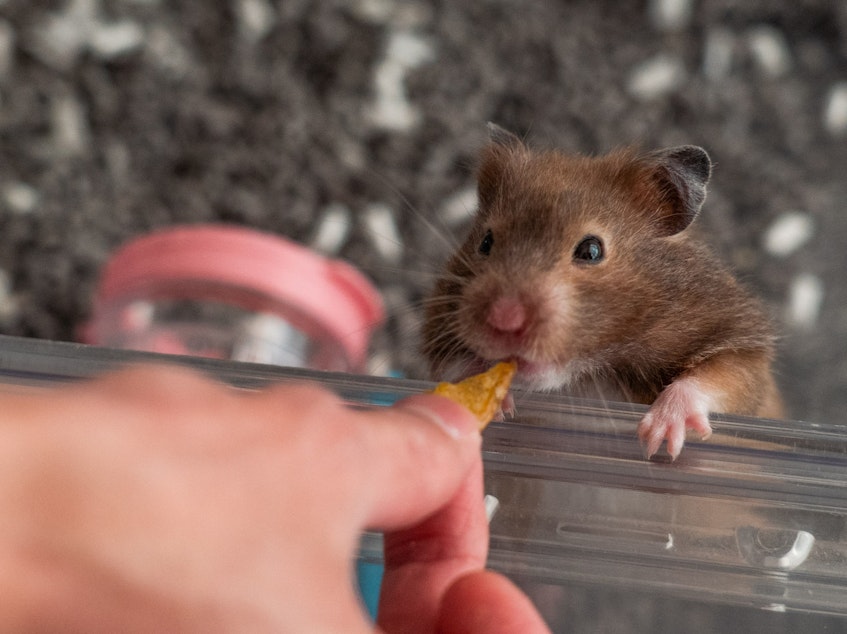Coronavirus FAQ: Are pets a threat? My immunocompromised pal had COVID. Can I visit?

Each week, we answer frequently asked questions about life during the coronavirus crisis. If you have a question you'd like us to consider for a future post, email us at goatsandsoda@npr.org with the subject line: "Weekly Coronavirus Questions." See an archive of our FAQs here.
I read that Hong Kong killed thousands of hamsters after a report that 11 hamsters in a pet store, as well as a human employee, tested positive for COVID. Should I be worried about my hamster ... or cat or dog?
So yes, animals can get COVID. And it can even prove fatal. In November, a snow leopard at the zoo in Sioux Falls, South Dakota, died after reportedly experiencing COVID-like symptoms.
But human-to-animal transmission is "rare, very rare," says Charlotte Baker, an assistant professor of epidemiology at Virginia Tech. The same goes for pet-to-human transmission (although, keep in mind that the virus did almost certainly cross from animals to humans to start this pandemic). One study shows that infected cats can transmit virus for up to 5 days, but did not find evidence of transmission from dogs.
So Hong Kong's massive hamster cull, says transmission experts, was ... overkill.
Sponsored
If you do have COVID and are an extremely cautious person, you might not cuddle as much with your pooch or feline or ... pet rodent. Of course, a hamster won't be jumping in your lap and begging for a hug.
And if you're worried that your pet does have COVID? "I wouldn't suggest testing your dog," says Dr. Preeti Malani, an infectious disease doctor at University of Michigan Health in Ann Arbor. "That's not a good use of test kits since they're in low supply." If your canine seems under the weather, call the vet!
A relative who's on dialysis caught COVID, was hospitalized and now is back home — in her assisted living apartment building. Is it safe for me to visit her? Would I pose any risk to her?
Good questions.
When someone who is immunocompromised catches the virus, they typically take longer to clear the virus out of their body. That's because their immune system isn't super strong.
Sponsored
So "they'll shed virus for a longer period," says Dr. Abraar Karan, an infectious disease physician at Stanford University. That's why the Centers for Disease Control and Prevention suggests a 20-day waiting period from either the date of the first positive COVID test or the onset of symptoms in an immunocompromised individual.
Obviously, the patient should be free of symptoms at that 20-day marker and test negative — if they're able to get access to a test — before a visit can be considered.
But that doesn't mean you should just pop in.
After all, 20 days is just a number set by the CDC based on data to establish a reasonable waiting period for an immunocompromised person to recover from COVID. Viruses (as far as we know) do not understand and abide by numbers.
And there are different degrees of being immunocompromised — a category that includes those on dialysis, chemotherapy patients and individuals with autoimmune diseases. An individual might be considered moderately or severely immunocompromised. That's why our medical experts say to check with your friend or family member to see if their physician can offer guidance about visits.
Sponsored
Also, the visitor should take precautions to protect the immunocompromised individual and anyone you'd be in contact with during a visit. Wear a mask — in the highly protective N95 family as the CDC recommends. Even though it's unlikely that you'd reinfect a newly recovered patient, it's not impossible. What if your friend had the delta version and you have a budding case of omicron but don't yet know it, says Karan (although these days, he says, it's pretty much all omicron).
Meanwhile, it's not just COVID you need to worry about. You could be coming down with a cold or the flu, for example, and sure don't want to pass such pathogens on to the immunocompromised person you're visiting.
Let your acquaintance know you'll be careful. Baker, the epidemiology professor, is herself immunocompromised. When friends come to visit, "they stay masked as much as possible and I really appreciate that someone else is considering that they don't want to give me anything."
For those reasons, you should build in other precautions: visiting outside or with open windows — since airflow disperses pathogens — keeping six feet of distance during the visit and practicing good hand hygiene.
"By layering these strategies you take the risk to minimal," says Malani. Visits are important, she says. "It's important to try and take care of people's social needs during all this — being isolated isn't good."
Sponsored
Of course "some people are perfectly happy never seeing anyone," Malani says. "But for individuals whose health is poor, those visits can be something they look forward to.
"If for any reason you have to delay [a visit], find other ways to express your love and support." Maybe that'll mean a virtual schmooze via Zoom or a video call.
If it's not yet advisable to drop by, "send them some food!" says Baker. And if your friend has a sweet tooth, remember the wise words from an episode of The Mary Tyler Moore Show: "Chocolate solves everything." [Copyright 2022 NPR]



